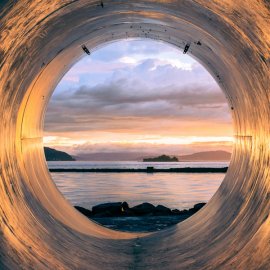Ocean Capitalism: Under the Guise of New
-
English
-
ListenPause
[intro music] Welcome to World Ocean Radio… I’m Peter Neill, Director of the World Ocean Observatory. Much discussion these days of the “blue economy,” as if this is a new phenomenon distinct from all the ways the ocean and economic activities have intersected in the past. From the first harvest of ocean resources to the first exchange of those resources, the ocean has been a major, albeit mostly invisible, factor in the economies of coastal villages, regions, nation-states, and international relations, indeed a predominate system of exchange that has created wealth, depleted natural value, and been, surely in the case of fossil fuels, a constant source of competition, conflict, insecurity, and injustice. Is economic growth by definition antithetical to the overall health of the society impacted in its name? The adjectives “green” and “blue” have come to modify initiatives to address the consequences and inequities derived. The environmental movement has advocated for principles, structures, and behaviors to inform and guide the development of protections, regulatory systems, new models of governance and international cooperation. Despite all the best intention, rhetoric, and half-steps forward, is there really credible progress to be demonstrated and acclaimed, or is all that vulnerable to co-option and exploitation? As much as I want to believe we are moving forward, I fear we may not be, in fact, are on the verge of being overwhelmed again by the concentration of capital that, in the name of progress, is perpetuating either the status quo or regress to old patterns: under the guise of new. Let’s consider two examples: First, the ocean economy is dominated by the following interests: container shipping, offshore oil and gas production, shipbuilding and repair, maritime equipment and construction, port activities, seafood, cruise tourism, and most recently wind energy. This is a global concentration of control, market and political leverage, and distribution of value extracted from the ocean and transferred to shareholders, pensions and sovereign funds, and certain financial institutions and investment banks with the capacity to manipulate, trade, and hedge these assets to only their advantage. Thus, the problems of consolidation, competition, conflict, insecurity, and injustice in the living ocean community are not mitigated, but continue or even expand. Second, there is an added dimension by the recent creation of a new asset class, called Natural Asset Companies, which are designed to turn ecosystems and related services into tradable financial commodities, an invention of the Intrinsic Exchange Group (ESG), in partnership with the NY Stock Exchange. The ESG website represents it purpose as “providing a world-class platform to list these companies for trading, enabling the conversion of natural assets into financial capital. … to capture the intrinsic and productive value of nature and to provide a store of value based on the vital assets that underpin our entire economy and make life on earth possible.” Regardless of the proponents’ justifications, this is as if all of Nature has been put up for sale, withdrawn from the commons, privatized, monetized, with the transfer of control of ecosystems and ecosystem services to an exclusivity of very limited interests. Sustainability services that might be owned and traded include water rights and purification, carbon sequestration, tourism, pollination, food production, soil fertility, fisheries coastwise and outside the limits of national jurisdiction. These companies will have immediate, disproportional access to government through lobbyists, campaign contributions, political influence, and market forces, able to shape regulation to their agendas, and have deep influence on the lives of farmers, fishers, environmental conservation and markets and communities far beyond traditional boundaries and community interests. On its website, the Intrinsic Exchange Group claims that its efforts will offset the negative externalities of pollution and climate change, “remove costs from the producers of good and services and place them on the general public, a massive and unfair hidden tax and subsidy,” and advance the positive externalities, “benefits like the production of oxygen or fresh water that nature produces, are not included in the Gross Domestic Product (GDP) and do not provide a means to wealth creation.” The ocean is a global source of oxygen and fresh water, a worldwide ecosystem process that has no value? By not being included in our calculation of Gross Domestic Product? Valueless because it is not a means of wealth creation? Whose wealth? Yours? Not mine. What would you rather keep as “intrinsic” value? Stock price? Or breathable air? Dividends and capital gains? Or clean water? We will discuss these issues, and more, in future editions of World Ocean Radio. [outro music]
Is economic growth antithetical to the overall health of society? This week on World Ocean Radio we discuss the concentration of capital and offer two examples of an ocean economy currently dominated by special interests, including the recent creation of Natural Asset Companies designed to turn ecosystem services into tradable commodities.
About World Ocean Radio
Peter Neill, Director of the World Ocean Observatory and host of World Ocean Radio, provides coverage of a broad spectrum of ocean issues from science and education to advocacy and exemplary projects. World Ocean Radio, a project of the World Ocean Observatory, is a weekly series of five-minute audio essays available for syndicated use at no cost by college and community radio stations worldwide.
World Ocean Radio is produced in association with WERU-FM in Blue Hill, Maine and is distributed worldwide by the Public Radio Exchange and the Pacifica Network.
Available for podcast download wherever you listen to your favorites.
Image
Photo by Erlend Ekseth on Unsplash
@er1end
- Login to post comments



